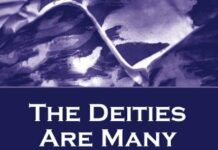
Ebook Info
- Published: 2012
- Number of pages: 189 pages
- Format: PDF
- File Size: 2.58 MB
- Authors: Jordan Paper
Description
Explores the human experience of mysticism and looks at it within the spiritual traditions around the world.The mystic, zero, or void experience—the ecstatic disappearance of self along with everything else—is considered by those who have had it to be the most beautiful, blissful, positive, profound, and significant experience of their lives. Offering both a descriptive and a comparative perspective, this book explores the mystic experience across cultures as both a human and cultural event. The book begins and ends with descriptions of the author’s own mystical experiences, and looks at self-reported experiences by individuals who do not link their experiences to a religious tradition, to determine characteristics of this universal human experience.These characteristics are compared to statements of acknowledged mystics in diverse religious traditions. The mystic experience is also situated within other ecstatic religious experiences to distinguish it from similar, but distinct, experiences such as lucid dreams, shamanism, and mediumism. Jordan Paper goes on to look at how the mystic experience has been considered in various fields, such as sociology, psychology, anthropology, biology, and comparative religious studies.Jordan Paper is Professor Emeritus of Humanities at York University and Associate Fellow at the Centre for Studies in Religion and Society at the University of Victoria. He has written several books, including Offering Smoke: The Sacred Pipe and Native American Religion and The Chinese Way in Religion, Second Edition (coedited with Laurence G. Thompson).
User’s Reviews
Reviews from Amazon users which were colected at the time this book was published on the website:
⭐Excellent!!
⭐The Mystic Experience: A Descriptive and Comparative AnalysisJordan Paper[…]Paper puts forth a bizarre terminology usage that breaks the conventions in a strong-arm way: throughout the book every time he writes ‘the mystic experience’ he means strictly and exclusively one particular experience. He doesn’t do a great job of describing that particular experience. He contradicts himself regarding the nature of that experience, making it hard to summarize his portrayal of it. Sometimes he characterizes that experience as a complete loss of consciousness, sometimes as pure awareness without mental content.He’s been reading too much Forman, who has an exagerrated near-exclusive interest in ‘the pure consciousness event’ at the expense of what Paper covers under the broad term ‘ecstatic religious experiences’. Paper is basically consistent in his use of the broad term ‘ecstatic religious experiences’ and his super-narrow use of the term ‘the mystic experience’.Against Paper, cessation of mental-construct processing is interesting, but it is not in every sense the ultimate center of all value in mysticism or in the dissociative state of cognition. Cessation of mental-construct processing is a peak religious experience but it is a lack of balance and proportion to make an entire religion (model of mysticism) out of solely that one aspect, that one feature, of the dissociative, mystical cognitive state. The book has a lot to offer after, or if, you can tolerate this constant irritating violation of established usage. The dissociative state has myriad aspects and dynamic features, but Paper only intends a single aspect or feature every time he writes ‘the mystic experience’.He writes that “research on near-death experiences… incorporate many features of the mystic experience”, yet he always defines ‘the mystic experience’ in too narrow of a way to allow talking of its “many features”.It requires two passes or attempts to review this book: one to remark on the annoying weird usage that narrows the term ‘the mystic experience’ down to a single particular experience, and another attempt at a review in order to critique that take on that particular experience and critique his overall contributions to the book. The book’s overall contributions are blocked and impeded by the issue of Paper’s bizarre and irritating super-narrowing re-definition of the term and construct ‘the mystic experience’. He ought to use a more specific, less confusing term such as Forman’s clear and explicit term ‘pure consciousness event’.
⭐Having experienced the singular subject of this book, I applaud the heroic attempt to describe the ineffible pinnacle experience of God. It’s not a ‘dissociative’ experience, it is completely non-associative. The human self has momentarily ‘resorbed’ into God Consciousness, and God is not a human, but Vast Fullness-Emptiness, and other poetic, symbolic words that language – intellect simply can not begin to grasp. Even so, this extremely rare, transcendent experience is common to all humankind throughout all cultures and times.
Keywords
Free Download The Mystic Experience: A Descriptive and Comparative Analysis (SUNY Series in Religious Studies) in PDF format
The Mystic Experience: A Descriptive and Comparative Analysis (SUNY Series in Religious Studies) PDF Free Download
Download The Mystic Experience: A Descriptive and Comparative Analysis (SUNY Series in Religious Studies) 2012 PDF Free
The Mystic Experience: A Descriptive and Comparative Analysis (SUNY Series in Religious Studies) 2012 PDF Free Download
Download The Mystic Experience: A Descriptive and Comparative Analysis (SUNY Series in Religious Studies) PDF
Free Download Ebook The Mystic Experience: A Descriptive and Comparative Analysis (SUNY Series in Religious Studies)

